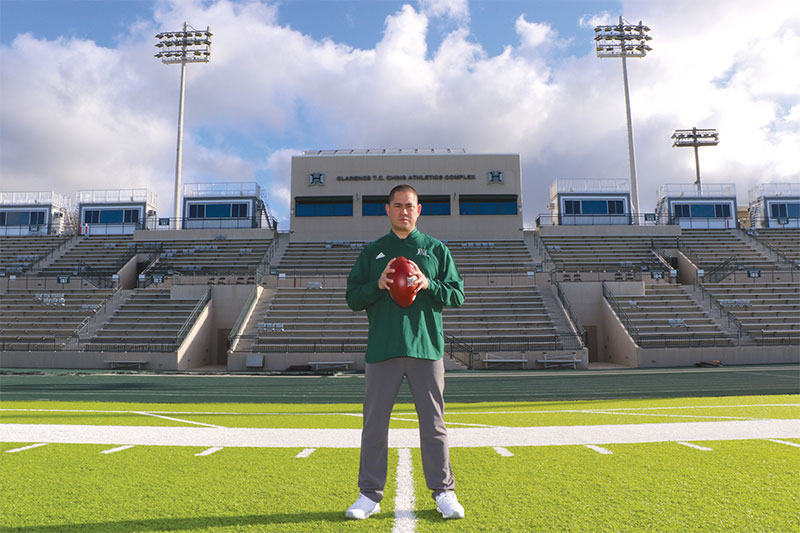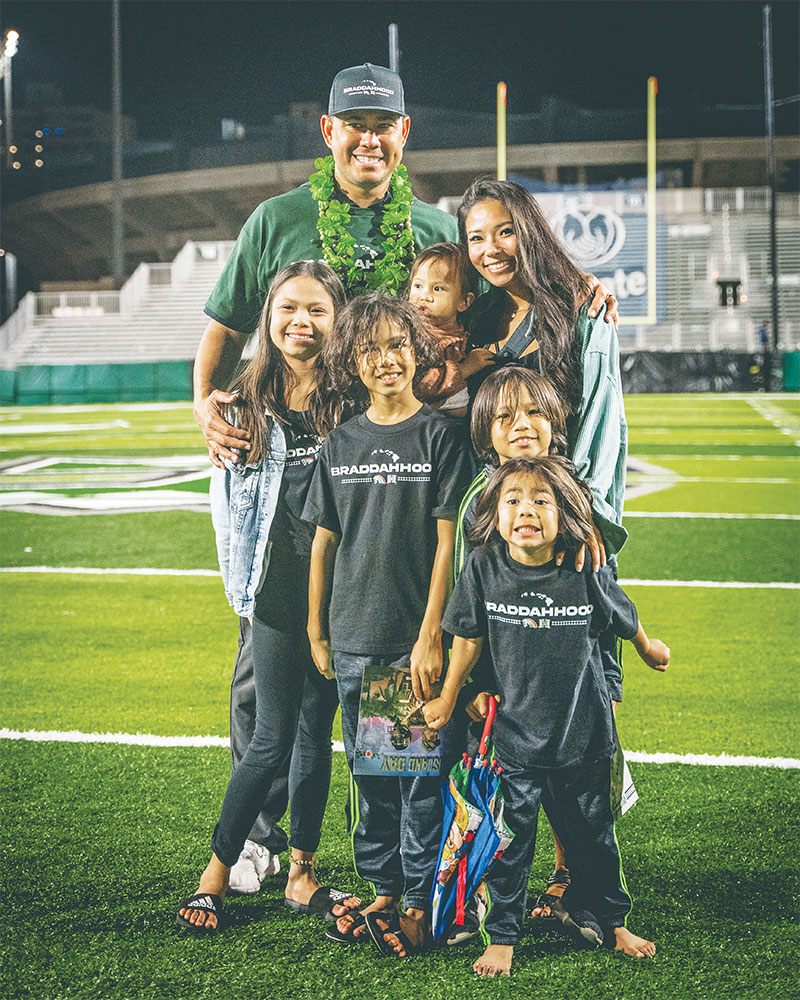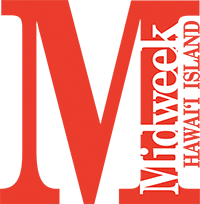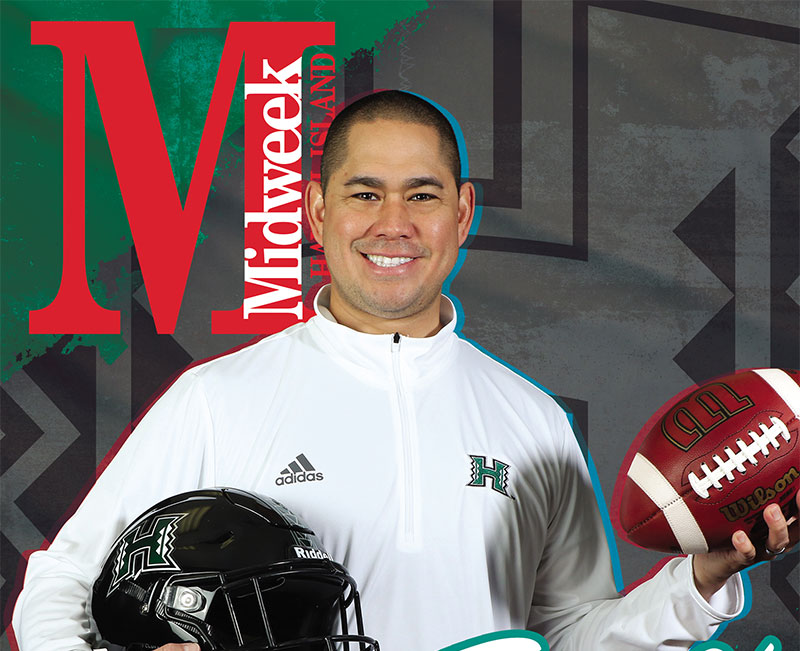Timmy’s Time

The Timmy Chang era officially kicked off last weekend with the former Rainbow Warrior passing great bringing the magic back to Mānoa.
When new University of Hawai‘i football skipper Timmy Chang took the field last Saturday for the team’s season-opener against Vanderbilt, it wasn’t surprising that he found himself momentarily flashing back to his days as a record-setting Rainbow Warrior quarterback and reminiscing about how his journey to Mānoa all began.
As many pigskin fans may remember, the former gunslinger was not only the bee’s knees among prep quarterbacks in the late ’90s, but also one of the nation’s top high school recruits at his position. Yet despite having the option to play college football just about anywhere else in the country, Chang chose to commit to UH and suit up for June Jones, the man whom he beat out for the vacant head coaching position earlier this year.

Among Timmy Chang’s biggest and proudest supporters are wife Sherry and their five children.
In recalling his reason for staying home and playing for UH, Chang points to Jones’ wide-open offense and how his imagination as a young field general was captured by his former coach, who took a winless team in 1998 and turned it into a conference champion the following season.
That ability to miraculously right a team’s fortunes in a single year, and do it with pass-friendly prowess, was both inspirational and attractive to Chang. But what really sealed the deal for him was the opportunity to do it all in front of the home crowd.
“I saw that excitement in the stands during my senior year at Saint Louis, and I saw the state rally around that team. I even saw 40,000 people at Aloha Stadium throwing confetti onto the field,” Chang fondly recalls. “So, I thought to myself, ‘Hey, I have a chance to play in a lot of cool places, but there’s nothing like staying home and representing the state.’”
Recapturing that glory of yesteryear is what drives the Rainbow Warrior boss these days. It’s why he returned to the islands as the program’s 25th head coach after spending the last decade on the mainland as a collegiate assistant.
And it’s why he’ll do just about anything to bring the magic back to Mānoa.
To accomplish that, Chang knows he’s going to have to make smart calls moving forward. He also understands that he needs to be a figure in whom the players can trust and believe in — and someone whose winning ways as a former quarterback rubs off on his players. Those favorable traits of his, which he’s been showcasing since his prep days as a Crusader, are what he’s banking on as he transitions into a full-time head coach operating within his dream job.
“When I was 18, I was just trying to be the best quarterback I could be and trying to make the best long-term decisions and hopefully make some good decisions along the way,” says Chang. “It’s kind of the same thing now. I’m a first-year head coach and I’m trying to make long-term decisions, but at the same I’m trying to make really good decisions as we climb as a program and try to establish ourselves as one of those dominant Hawai‘i teams.”
Of course, helping the program reach that kind of success again means in part persuading the state’s standout high school players to, just as he did two decades ago, choose the path of the Rainbow Warriors. Relishing the challenge, Chang believes he and his staff can ultimately convince some of Hawai‘i’s homegrown talent that the grass is just as green in Mānoa as it is anywhere else.
“Sure we’d like to be chosen first, but all we need is at least one of the big ones in Hawai‘i to say, ‘Hey, I’m going to come in and represent the state’ — just like how I did, and then other players followed along,” says Chang.
To his credit, the head coach has already been expanding his outreach efforts in Hawai‘i’s communities and stressing the importance for tomorrow’s Rainbow Warrior to believe he has a future in the islands beyond his college-playing days. Additionally, Chang has been helping to create a sense of unity among existing players, fans and the general public. This is clear from the team’s oft-repeated mantra of “Da Braddahhood,” a pidginized reference to the players growing sense of family and lifelong commitment.
“Da Braddahhood is not just a short-term thing, it’s a forever thing,” says Chang when asked to explain the concept that was developed by players and the school’s athletic department. “But it also includes everybody in the state. We want them to grasp it, rally behind it and come be a part of it.
“We’re all in this together,” he adds. “The whole thing that I’ve been doing is trying to make sure that everybody feels like a part of this team. That’s the biggest thing.”
As natural as Chang is at the sport, it’s important to note that he didn’t begin playing organized football until his early teens. Up until then, his focus in athletics was primarily twofold — basketball and baseball — despite spending much of his youth serving as a ball boy for his father, Levi, a school principal and basketball coach who also worked football games as an Interscholastic League of Honolulu official.
But all that changed once the Waipi‘o Gentry native entered Saint Louis as a seventh-grader and Levi green-lighted his gridiron participation. At first, the youngster wanted to play defensive back “because it looked like an athletic position.” However, his PE coach, who also served as the intermediate team’s offensive coordinator, thought otherwise and convinced him that he could put his baseball arm to better use by operating behind center. Chang credits that teacher and coach, Doug Frias, as well as the tutelage received under passing guru Vinny Passas, with his development into a bona fide quarterback.
Almost immediately, Chang’s performances on the field were nothing short of sensational. In his eighth- and ninth-grade seasons, he led his teams to titles. The same thing happened during his sophomore and junior years as he capped off those campaigns with Prep Bowl victories. Finally in his senior season, Chang put an exclamation point on a sterling prep career by marching the Crusaders to the first-ever Hawai‘i High School Athletic Association State Football Championship. Along the way, he threw for just over 8,000 yards and a staggering 113 touchdown passes — 64 of which came during his final campaign. Those TD numbers remain state records to this day.
His outstanding play only continued at UH, where in five seasons, Chang passed for an astonishing 17,072 yards and 117 touchdown strikes — the former total placing him second to Houston’s Case Keenum in NCAA Division I history, while the latter leaving him in the 11th spot all-time for most TD tosses. More importantly, his passing heroics produced wins for his team — highlighted by the Rainbow Warriors’ victories in the 2003 and 2004 Hawai‘i Bowl games, in which Chang was named MVP and co-MVP, respectively.
Ever humble, Chang is quick to credit others with his success on the gridiron. They include everyone from “the Good Man Upstairs who put me on the path with really good people around and I got to learn to play football at a very high level early on,” to studying under and playing for a few of the game’s very best coaches.
“You can always tell when you got really good coaches because the future coaches of the profession fall from their trees,” he observes. “I was under June, I was under Cal and Ron Lee, and I was under Vinny Passas, and that’s kind of what grew me into what I am today.”
But Chang’s studious mind and determined makeup were also critical in his development. After all, others have played for and been tutored by these same coaches and more, but not many have come close to enjoying the type of success Chang had on the field as a player.
“One of the things that my dad used to talk about is mental toughness — just outworking people, always being diligent, always being smart, always using your mind. That’s what carries you further,” he explains.
“I wasn’t the biggest quarterback, I wasn’t the fastest quarterback, and I probably didn’t have the strongest arm,” he continues, “but by just being smart about things, to keep coming, to keep having that work ethic so that you’re not outworked by anybody, that’s the kind of mentality that I had.”
It’s the type of mental toughness that Chang hopes will be on display among his players. For his part, he vows to be with them every step of the way while watching them coalesce into a mean, lean fighting machine that hopefully produces magic on and off the field — just like he once did as a player in Mānoa.
“I work for those guys every day,” says Chang in closing. “I want to give them everything they will need to be successful on the field on Saturday, and be successful when they leave here for the rest of their life.
“That’s my job.”


